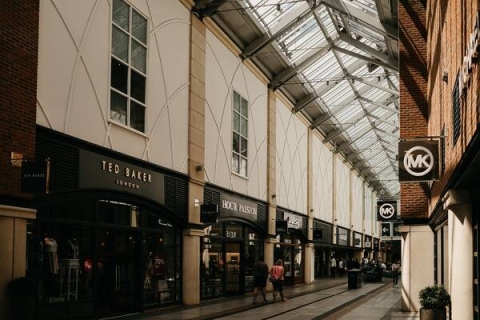

The research examined how people feel when in the presence of large crowds of other shoppers
7 April 2021
4 min read
A new study suggests that shoppers may be fearful of returning to large enclosed shopping centres when lockdown restrictions ease on 12 April to allow non-essential retail to open.
Researchers from the Universities of Portsmouth and Edinburgh in the UK, Saint Xavier University in the United States and the Universidad Externado de Colombia in Bogota, Colombia found that shoppers experience higher levels of stress, lower levels of excitement, and greater difficulty focusing on a shopping task when in the presence of large crowds of other shoppers.
Since the Covid-19 outbreak, people have been required to avoid crowded spaces, maintain social distancing in retail stores and shop alone when possible, and to avoid touching public surfaces. These ‘new normal’ behaviours work against enclosed shopping centres in terms of being attractive destinations for shoppers. However, they could be a boost for smaller, independent shops where there are not so many people.
Study co-author Dr Jason Sit, Senior Lecturer in Marketing at the University of Portsmouth, said: “COVID-19 has had a huge impact our lives including the ways we perceive and interact with other people in enclosed spaces. For over a year now, we have been ‘conditioned’ to avoid being at crowded venues, maintain social distancing from others and shop alone at retail stores when possible, in order to minimise human-to-human contacts and thus the contagion.
Prior to COVID-19, many shopping centres were already experiencing decreasing consumer traffic. These fears may be exacerbated by concerns regarding close social interaction with other shoppers and a concern about air circulation in an enclosed setting.
Dr Jason Sit, Senior Lecturer in Marketing
The study, published in the International Review of Retail, Distribution, and Consumer Research, studied the emotions of 450 shoppers from an enclosed shopping mall in Bogota, Colombia - this mall is the largest in Colombia and the third largest in Latin America.
The shoppers watched three 10-minute videos that featured a typical shopper’s journey through the mall (e.g. parking lot, escalator, stores, food courts, restrooms, relaxing areas). One showed the centre without any other shoppers present; the second video featured the same mall journey during midweek, later in the evening, and showed a ‘few people’ in terms of social presence; and the third video featured the identical mall journey during a busy weekend and showed the presence of ‘many people’ on a typical weekend day. The shoppers wore an EEG headset that measured and recorded their emotional responses to each scenario.
The researchers found that the mere presence of other shoppers in an enclosed space evoked high levels of stress, decreased excitement, and impeded a shopper’s ability to focus on a task. The data showed shoppers experienced feelings of discomfort as the number of people increased from zero (no shoppers), to a few (a typical evening in the mall), to many (a typical weekend in the mall).
The findings imply that shoppers may avoid shopping centres because of their reaction to the social presence of other people, which promotes negative attitudes toward enclosed spaces.
They also suggest that other sectors of society may also experience similar responses as we move out of lockdown.
Dr Sit said: “Given that the mere social presence of others in enclosed spaces may cause consumer discomfort, other venues that attract large groups of consumers, such as theatres, recreation centers, concert halls, subway systems, and so forth, may not return to pre-COVID profitability for some time.
“However, our findings may not apply to non-retail collective events, where people crave for the social presence of others (ie the crowds) and welcome it as an essential part of the experiential co-creation, like the roars from the crowds at a football match.”
